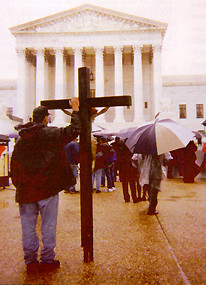|
PRO-LIFE NEBRASKA |
|
|
|
PRO-LIFE NEBRASKA |
|
|
|
Impressions of Carhart v.
Stenberg: |
|
It seemed only fitting that the two times I was at the U.S. Supreme Court in April and June were both dreary, rainy days. Of course the days prior to and following both events were sunny and clear. On April 25th as I prepared to listen to the oral argument in Carhart v. Stenberg. another bit of irony struck. In its usual proceedings before the Court, the Clerk of the Court announces the justices and says: "Oyez, Oyez.....God Protect This Country And This Honorable Court," Greg Schleppenbach and I craned our necks to see where other references to God might be found within the courtroom. We could not locate the Ten Commandments which we had heard were inscribed therein. |
 Greg Schleppenbach, Bishop's Pastoral Plan for Pro-Life Activities; Julie Schmit-Albin, Nebraska Right to Life and Bob Blank, Metro Right to Life |
 Outside the U.S. Supreme Court following the oral arguments in Carhart v. Stenberg on April 25th |
The nine justices seemed to materialize through the thick red draperies hung behind the bench. Seated higher than the audience in the courtroom it's easy to get the impression that they are all omnipotent. It's also easy to get caught up in the moment, with all the security and high drama which preceded our being seated in the courtroom. Every seat was accounted for. But the longer I sat watching the workings of the highest court in the land, the more focused I became. They weren't omnipotent after all, but nine mere mortals whose decision would further dictate the direction our country was headed, What seven members of a nine member court wrought in 1973 struck home more closely for me than ever, as I was seated there. And now we were listening to the pro-abortion counsel for partial-birth abortionist Leroy Carhart plead his case, for what is clearly tantamount to infanticide. I was proud of Attorney General Don Stenberg's reasoned defense of our state ban on partial-ban abortion. |
| Justice Antonin Scalia was particularly eloquent in his comments in April as to the level of coarseness which would pervade our society if we let horrors such as partial-birth abortion continue unabated. After a precise hour of arguments, the courtroom practically emptied while other cases were taken up. Outside in the rain we hurried down the steps to hear AG Stenberg's and National Right to Life Legal Counsel Jim Bopp's comments to the national media, Greg, Bob Blank and I huddled under one umbrella as the rain got more intense. It was almost impossible to hear what was being said. A free-for-all ensues in such occasions as both pro-life and pro-abortion spokespersons battled for the microphones. The weather hampered this process considerably. Lt. Governor Dave Maurstad, the sponsor of the law which had brought us all there, got his chance at the mikes after AG Stenberg. Once they emerged from the crowd all of us congratulated and thanked Stenberg before he went off to do other interviews. After most of the pro-abortion groups had issued their sound bites; Bob, Greg and I ventured forth and briefly spoke for Nebraska's pro-life organizations to the press that was still there. |
|
| It wasn't until I read Nebraska's newspapers on-line the next day that I learned State Senator Jon Bruning of Omaha was already thinking about introducing another partial-birth abortion ban with a health exception. We have yet to see what Senator Bruning's thoughts are in regard to crafting a health exception that doesn't permit abortion on demand for any reason, as is the case with the health language taken from the Doe v. Bolton companion decision to Roe v. Wade. Nebraska Right to Life will wait to see what direction National Right to Life takes in response to the court decision. |
|
|
| In reading through the dissents to the majority written by Justices
Scalia, Kennedy and Thomas, one is encouraged by their ability to cut through the legalese
for the layman and get to the heart of the matter.
Justice Scalia: "Today's decision, that the Constitution of the United States prevents the prohibition of a horrible mode of abortion, will be greeted by a firestorm of criticism,..as well it should....If only for the sake of its own preservation, the Court should return this matter to the people, where the Constitution, by its silence on the subject, left it and let them decide, State by State, whether this practice should be allowed. Casey must be overruled." |
||
| Justice Thomas: " We were reassured in Casey that not all regulations of abortion are unwarranted and that the States may express profound respect for fetal life. Under Casey. the regulation before us today should easily pass constitutional muster. But the Court's abortion jurisprudence is a particularly virulent strain of constitutional exegesis. And so today we are told that 30 States are prohibited from banning one rarely used form of abortion that they believe to border on infanticide. It is clear that the Constitution does not compel this result." |
|